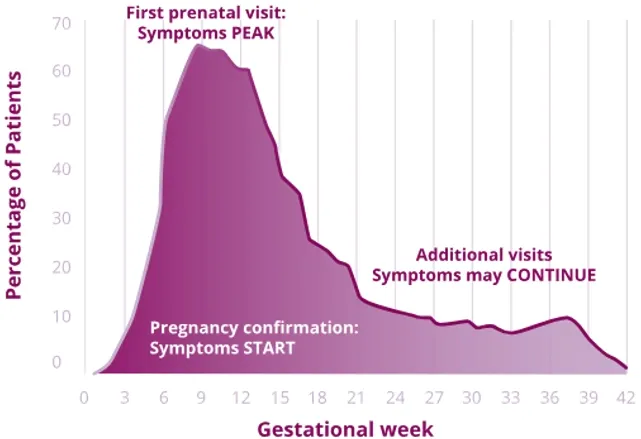INDICATION AND IMPORTANT SAFETY INFORMATION
INDICATION
BONJESTA® is a prescription medicine used to treat nausea and vomiting of pregnancy in women who have not improved with change in diet or other non-medicine treatments.
LIMITATIONS OF USE
It is not known if BONJESTA® is safe and effective in women with severe nausea and vomiting of pregnancy, a condition called hyperemesis gravidarum. Women with this condition may need to be hospitalized.
IMPORTANT SAFETY INFORMATION
BONJESTA® is intended for use in pregnant women. It is not known if BONJESTA® is safe and effective in children under 18 years of age.
Do not take BONJESTA® if you:
- are allergic to doxylamine succinate, other ethanolamine derivative antihistamines, pyridoxine hydrochloride or any of the ingredients in BONJESTA®. Please refer to the Patient Information leaflet for the complete list of ingredients.
- take monoamine oxidase inhibitors (MAOIs). Ask your healthcare provider or pharmacist if you are not sure if you take an MAOI, including Marplan, Nardil, Emsam, Eldepryl, Zelapar, and Parnate.
Before taking BONJESTA®, tell your healthcare provider about all of your medical conditions, including if you: have eye problems called increased intraocular pressure or narrow angle glaucoma; have a stomach problem called stenosing peptic ulcer or pyloroduodenal obstruction; have a bladder problem called urinary bladder-neck obstruction; are breastfeeding or plan to breastfeed. BONJESTA® can pass into your breast milk and may harm your baby. You should not breastfeed while using BONJESTA®.
Tell your healthcare provider about all the medicines you take, including prescription and over-the-counter medicines, vitamins, and herbal supplements.
How should you take BONJESTA®?
- Talk to your healthcare provider about how much and when to take BONJESTA®.
- Take BONJESTA® everyday as prescribed by your healthcare provider. Do not stop taking BONJESTA® without talking to your healthcare provider first.
- Do not take more than 2 tablets (1 in the morning and 1 at bedtime) each day.
- Take BONJESTA® tablets whole on an empty stomach with a glass of water.
- If you take too much BONJESTA® (overdose), you may have the following symptoms: restlessness, dry mouth, the pupils of your eyes become larger (dilated), sleepiness, dizziness, confusion, fast heart rate, seizures, muscle pain or weakness, urination changes and build-up of fluid in the body. If you have these symptoms and they are severe, they may lead to death. If you take too much BONJESTA®, call your poison control center at 1-800-222-1222.
What are the possible side effects of BONJESTA®?
- The most common side effect of BONJESTA® is drowsiness.
- Do not drive, operate heavy machinery, or do other activities that need your full attention unless your healthcare provider says that you may do so. Do not drink alcohol or take other CNS depressants such as cough and cold medicines, certain pain medicines, and medicines that help you sleep while you take BONJESTA®. Severe drowsiness can happen or become worse causing falls or accidents.
- BONJESTA® may cause an incorrect positive result for urine drug screening tests for methadone, opiates and PCP.
These are not all the possible side effects of BONJESTA®. Call your doctor for medical advice about side effects.
Keep BONJESTA® and all medicines out of the reach of children. Carefully read the storage instruction as detailed in the BONJESTA® Patient Information leaflet.
Duchesnay USA encourages you to report negative side effects of prescription drugs to the FDA. Visit www.fda.gov/medwatch or call 1-800-FDA-1088






















